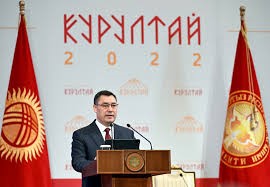Tensions between Moscow and Bishkek over the Kyrgyz language
President Žaparov signed constitutional law obliging state officials to be able to use the Kyrgyz language, eliminating an ambiguity in the post-Soviet constitution that equated it with Russian. To access public places you will need to pass a language test and even advertising messages will be only in Kyrgyz. Moscow protests in support of Russian speakers.
Bishkek (AsiaNews) - Last week the president of Kyrgyzstan, Sadyr Žaparov, signed the constitutional law which obliges state officials to be able to use the Kyrgyz language. The Bishkek parliament called it a "historic decision".
After the entry into force of the law, reactions immediately began from the Kremlin, which claims the equal dignity of the Russian language, also defined as an "official language", but now in second order compared to Kyrgyz.
The first law on the state language in Kyrgyzstan was approved in 1989, at the end of the Soviet era, equalizing the two languages that after the end of the USSR were distinguished into "state" and "official", with various clarification modifications in the subsequent years, until the current inclusion in the constitution.
The chairman of the national commission on the state language, Kanybek Osmonaliev, said in an interview with Azattyk that "the law is designed to implement article 13 of the constitution, which had remained undefined for 34 years".
The article concerns precisely the two languages, and the conjunction "or" has been eliminated in the possibility of using them with regard to official documents (state or official language).
It is an ambiguity existing in all ex-Soviet countries of Central Asia, which involves enormous complications in the drafting of international agreements, documents and more, where the alternation of the two languages causes continuous discrepancies and contradictions on terms often formulated differently in the double Slavic and Turanian linguistic roots, which have very little in common.
So not only must state employees know the language, but from now on everything will be produced in Kyrgyz, and only "if necessary can translations be made into other languages".
Those who do not pass level B-2 of the so-called Kyrgyztest will no longer be able to access state jobs, which will lead to stiff competition on the basis of language skills. Osmonaliev also adds that no additional expenses are envisaged, but that the responsibility for applying the law falls on the individual administrations and their managers, who will have to "create the conditions to achieve the pre-established goals".
Even private companies are required to produce official documentation in the Kyrgyz language, but specialists observe that the diffusion of the state language is still proceeding rather slowly and it will not be easy to get rid of Russian, also considering the widespread practices of corruption, in this case “linguistic condescension”.
The director of the language department of the municipality of Bishkek, Elvira Nijazbekova, however believes that the law was "long overdue, now we can start working on it seriously ... it is a source of great joy and pride for our people".
A very significant application, observes Nijazbekova, concerns advertising: from now on, according to the law, advertising agencies and the holders of related licenses will have to agree on the verification and correction of texts with the National Commission for Language Policy otherwise they will not be allowed to broadcast the messages.
In addition to documents, public manifestations of any state body will also be in Kyrgyz, such as elections and referendums with related campaigns, geographical names and commercial symbols.
The foreign ministry spokeswoman Maria Zakharova spoke from Moscow, warning that "the document could lead to a series of difficulties" for citizens who do not know the Kyrgyz language sufficiently, hoping that the country's authorities "are able to lead a balanced language policy".
The same minister Sergej Lavrov called for "support for the Russian language and culture and for a patriotic formation for Russians living in foreign countries", observing that "delicate processes are underway in the CIS countries, especially in Central Asia ... when it is with the new Kyrgyz law having appeared, we have warned our friends that it is not a fully democratic expression”.
At least in the sense that the Russians give to democracy, in which the elder must always prevail over the "younger brother". Žaparov assured that "there will be no discrimination", but the ongoing linguistic separation will cause many tensions and suffering.
24/07/2025 08:34
21/06/2025 11:42
25/11/2022 11:42
16/08/2021 10:33







.png)










